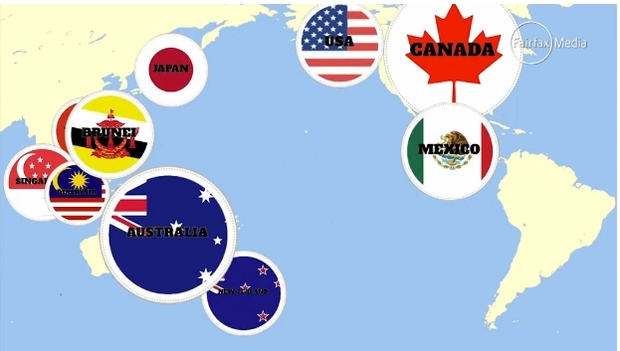
Image from a Sydney Morning Herald video.
It’s tough reporting on something only a few people know about - especially if they won’t say much about it.
New Zealand’s special agriculture envoy Mike Petersen told Morning Report last Thursday even he didn’t know the specifics of the deal for dairy products, but the secrecy surrounding the Trans Pacific Partnership has been in place for several years.
That’s fuelled suspicion about what our government - and others - might be signing up to, and what rights they might end up signing away.
In an editorial headlined “Into the Home Stretch” The Economist magazine said: “For all its flaws, the biggest trade deal in years is good news for the world. Critics have bemoaned the lack of disclosure but conducting negotiations in the open would have been a sure way to undermine them”
In one of just a few newspaper editorials on the issue this past week, Christchurch daily ‘The Press’ said:
“The problem with the criticisms is that because the talks have necessarily been in private, they have been based on leaks from what has been a work in progress. But the final deal is the only one that matters”.
All the more reason, surely, for the media to tell the public as much as they can as the negotiations reached the pointy end.
But not everyone in the media thought so.
Broadcaster Mike Hosking’s opinions have an extraordinary reach. He editorialises each weekday morning on Newstalk ZB and on TVNZ show Seven Sharp each evening. He also writes weekly in the New Zealand Herald, and back in June, he said that TPP suspicion was misplaced.
If you believe the darkest of dark stories, we are going to get overtaken by corporate America, our government will be able to be taken to court, no-one will be able to afford medicine.
The people who peddle this bollocks are anti-free trade and are simply out to scare us. Their main argument seems to have been that all of this has been negotiated in secret.
Just a small question - can anyone name any trade deal ever that's been negotiated in the open?
Two days later, law professor and vocal TPP critic Jane Kelsey answered his question in a letter to the paper:
Let's start with the EU’s refusal to sign an equivalent secrecy memorandum in its parallel negotiations with the US. Then there is the Anti-Counterfeiting Trade Agreement (ACTA) where Tim Groser welcomed the decision to revoke secrecy in 2010.
The pair clashed on this again this week on TVNZ prime time news show Seven Sharp.
Assuming this stuff makes most peoples’ eyes glaze over, the hosts apologised to viewers last Tuesday for even raising the issue, and a report headed “How does the TPP affect little old me at home” concluded by saying:
Depending on who you talk to its either a really good deal for a trading nation like ourselves, or a the big corporates getting bigger at our expense. We’ll know in due time when the deal is done. That’s when we will find out.
Seven Sharp host Mike Hosking also told viewers everyone should wait a year before deciding who’s right. But not everyone covering the TPP was prepared to simply wait for a fait accompli from Hawaii.
When the Prime Minister admitted on Tuesday that the cost of pharmaceuticals could rise it contradicted previous assurances that Pharmac’s finances would be unaffected. and journalist Gordon Campbell pointed out that TPP critics had been warning about that for ages.
In his own online magazine Werewolf back in 2011, Gordon Campbell looked at how drug patent registration changes cropped up in trade negotiations between Canada and Europe – and threatened to inflate Canada’s national health budget.
Throughout the long TPP process, there also have been revealing leaks of parts of some key texts to the media.
In Melbourne paper The Age this week the paper’s economics editor Peter Martin said (includes video) leaks have shown TPP provisions could clash with existing international agreements, potentially creating more red tape rather than bringing down barriers.
He said other leaks suggested big changes for Australia would relate not to trade, but to intellectual property and the controversial investor-state dispute settlement process, something previous PM John Howard successfully resisted in the Australia-US agreement in 2004.
TPP Secrecy didn’t stop commentators like Robert Reich - with the help of a flipchart and a marker pen - setting out why he felt it was is “the worst trade deal you've never heard of” in this two-minute video.
Robert Reich – often described as one of the architects of the North American Free Trade Agreement - is clearly not anti-free trade.
Closer to home, neither is economist Gareth Morgan, who outlined concerns on his website Gareth's World.
Trade is good – great really – and the more the better. But we know most of the tariff barriers have already been dismantled over the last 30 years, what really remains are the hidden non-tariff type barriers that often travel under the guise of something else. Think Australia and its attempts to prohibit imports from New Zealand of our apples on the grounds they pose a biosecurity risk. As we all know that went on for years.
But although his views were raised in Parliament Gareth Morgan only appeared in the New Zealand media this past week to talk about his new flag.
New Zealanders have been urged to participate in picking a new flag, but they have no direct say in any TPP agreement.
But while some took exception to trade minister Tim Groser telling reporters in Hawaii: “We need adults to do this, not breathless children to run off at the mouth when the deal is not actually finished” parts of the media lately did seem content to simply wait and see what emerged from Hawaii.

